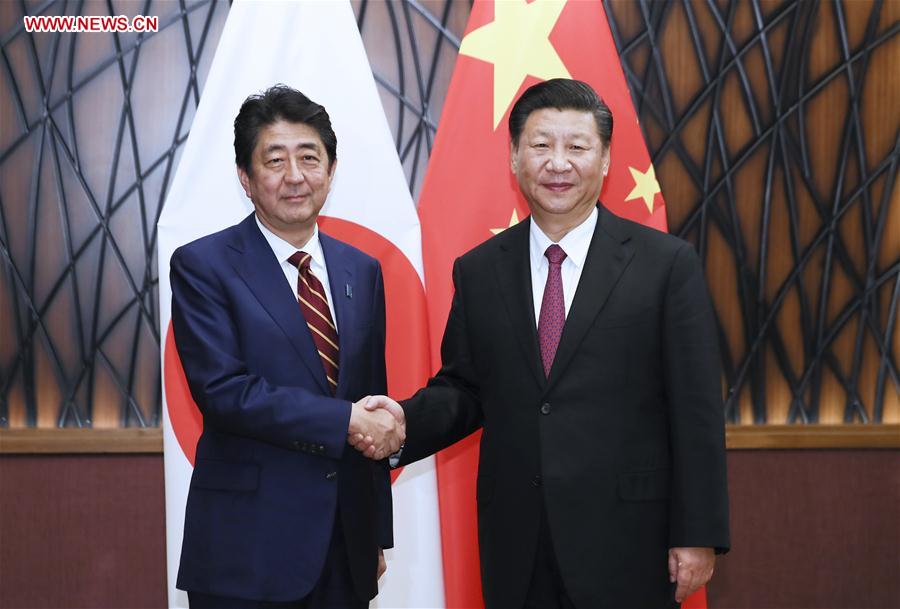History important in Sino-Japanese relations
- By George N. Tzogopoulos
 0 Comment(s)
0 Comment(s) Print
Print E-mail China.org.cn, January 7, 2018
E-mail China.org.cn, January 7, 2018
This year is the 40th anniversary of the signing of the China-Japan Treaty of Peace and Friendship. Both sides are taking steps to ensure a better perspective for the future.

Last November,President Xi Jinping and Japanese Prime Minister Shinzo Abe met on the sidelines of the Asia Pacific Economic Cooperation (APEC) summit in the Vietnamese resort city of Danang and agreed on a "fresh-start" in bilateral relations. More recently, Abe went further and said that he wanted to take the opportunity to deepen high-level exchanges with China in 2018.
Certainly, political and business affairs dominate the agenda. When Chinese Premier Li Keqiang met his Japanese counterpart in Manila some weeks ago, they affirmed their close coordination.
He also told the biggest ever Japanese business delegation to visit Beijing around the same time that ties between Asia's two biggest economies have been gradually improving. The Japanese business leaders welcomed this positive momentum.
This doesn't mean differences have been bridged. However, the preservation of peace and the advancement of economic globalization remain common objectives. No doubt, the promotion of communications and contacts between the two sides can facilitate fruitful dialogue on various existing complex factors.
The Beijing-Tokyo Forum, for instance, constitutes a useful platform in bringing Chinese and Japanese representatives from several fields closer together.
Within the framework of continuous discussions, however, history cannot be overlooked. Under the leadership of President Xi Jinping, China is attaching great importance to this. Specifically, three years ago, it designated a National Memorial Day to mark the anniversary of the 1937 Nanjing massacre when hundreds of thousands of civilians and unarmed soldiers were killed by the Imperial Japanese Army.
This year's ceremony coincided with the 80th anniversary of the day when Nanjing fell to the Japanese aggressors.
It is obviously problematic that the role of China in World War II has not attracted great attention by Western scholars and historians. As historian Rana Mitter explains, China has not been given sufficient credit for what has often been regarded as a purely American victory in Asia, and particularly the Pacific.
In his book Forgotten Ally, Mitter offers new insights that might form part of a fruitful debate regarding the revising of the history of WWII.
A fair analysis of developments in Asia and the Sino-Japanese war should acknowledge two important parameters. The first is the significant number of losses, as China suffered approximately 15 million deaths and saw a destruction of its infrastructure and agriculture production.
Massacres like the one in Nanjing are characteristic examples, while it cannot be ignored that most of country's rail network, sealed highways and factories were destroyed or seriously damaged. And the second parameter is the impact of these dramatic consequences on the future defeat of Japan.
We know that Japan made a huge investment in armed forces in its effort to dominate and control China. So, a hypothetical question can be asked: What would have happened, if Japan had won the Sino-Japanese war? A logical answer is that Japan could have not have necessarily surrendered as it finally happened.
Such a development might have extended the duration of World War II. The heroic stance and resistance of China to the Japanese aggression during World War II has to be considered as one of the most important reasons for the achievement of world peace in 1944-1945.
Responding to the Japanese policy of "Kill All, Burn All, Loot All," China showed great resolve in defending itself at any cost.
Last but not least, the contribution of China to world peace during World War II should not only be connected to developments in Asia, but also to the entire world. We should remember that in September 1940, a tripartite agreement was signed in Berlin between Germany, Japan and Italy.
Article 2 of this agreement stipulated that "Germany and Italy recognize and respect the leadership of Japan in the establishment of a new order in Greater East Asia." In the previous years, Italy had already occupied Abyssinia, Japan had attacked China and Germany had annexed Austria.
The role of China during World War II was a catalyst for world peace. On the one hand, the country managed to protect itself in spite of tremendous human losses, on the other, it contributed – with its determined stance of resistance – to the defeat of the Axis Powers.
Chinese archives reveal that, in the eight years from 1937 until 1945, allied forces killed and wounded about 1.95 million Japanese soldiers. About 70 percent of these casualties took place on Chinese battlefields.
All in all, China should be given a historical due. Politicians and businessmen have to carefully study the past when planning ahead. And the new generation of Chinese and Japanese people – as well as of the world community – need to remember history in looking towards the future.
George N. Tzogopoulos is a columnist with China.org.cn. For more information please visit:
http://www.china.org.cn/opinion/GeorgeNTzogopoulos.htm
Opinion articles reflect the views of their authors, not necessarily those of China.org.cn.






Go to Forum >>0 Comment(s)